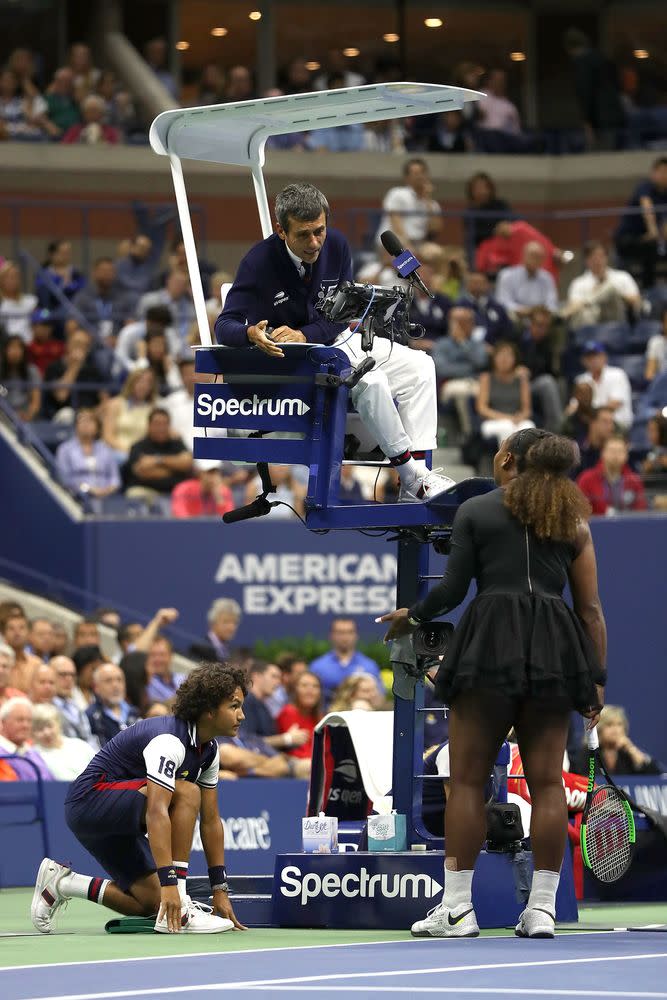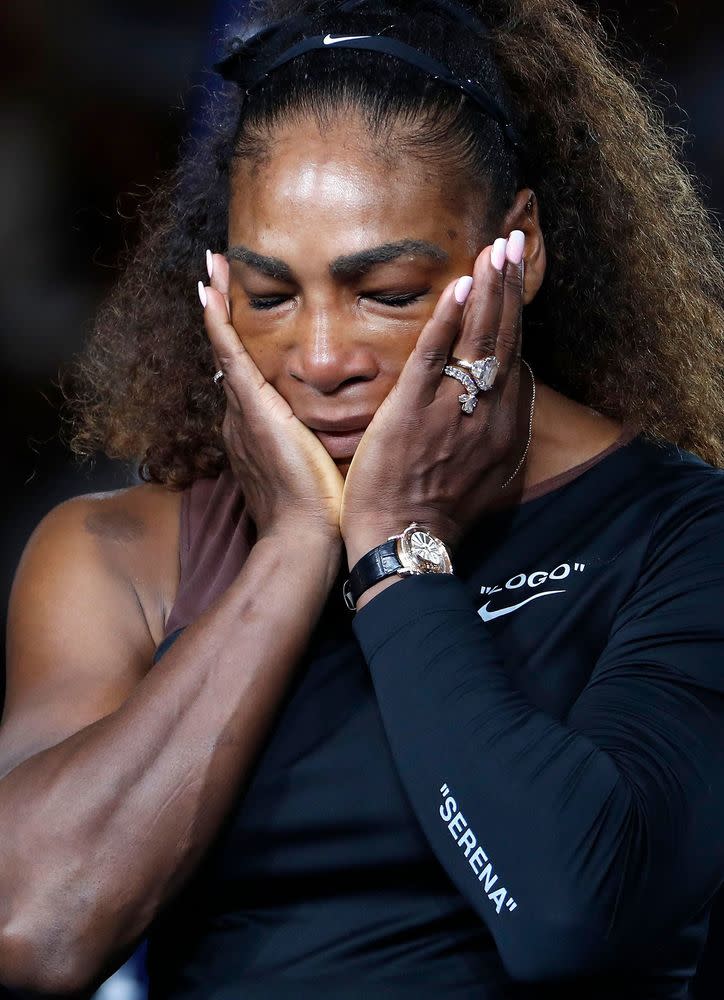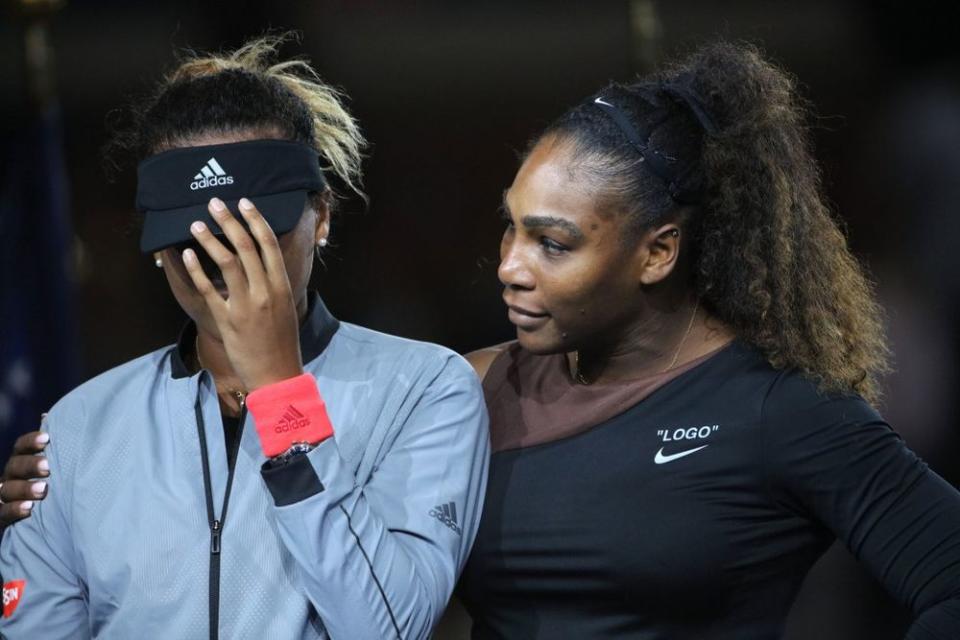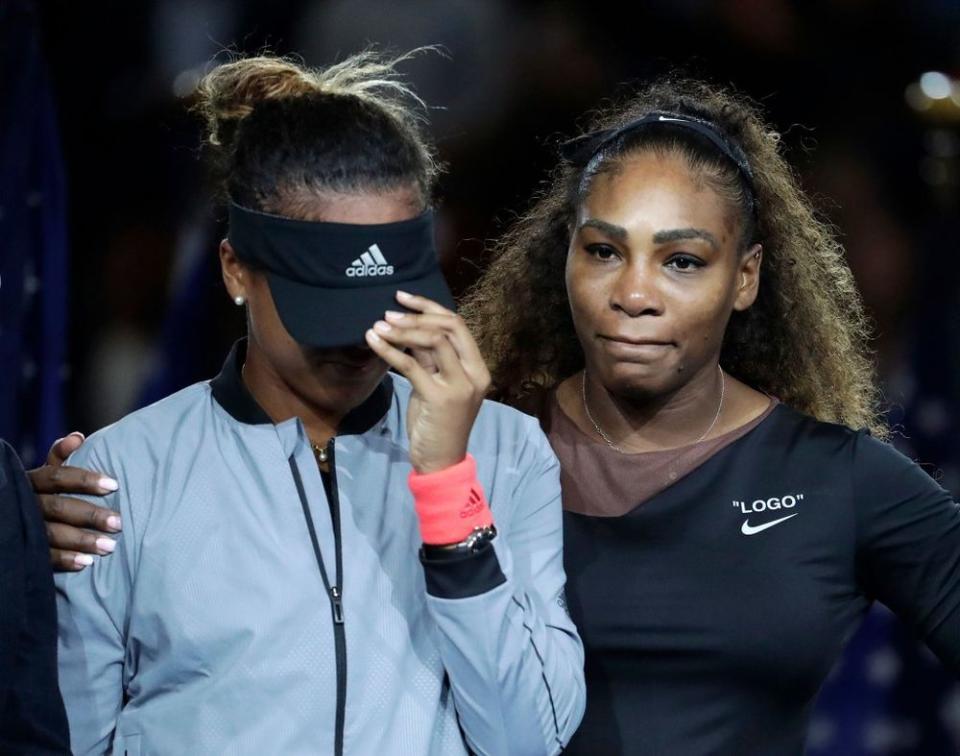Billie Jean King Says Serena Williams Is Treated Differently Than Male Athletes as WTA Backs Her
After Serena Williams‘ controversial loss to Japan’s Naomi Osaka at Saturday’s U.S. Open Women’s Final — during which Williams received three violations and confronted the chair umpire, whom she called a “thief” — tennis great Billie Jean King is addressing major factors that she says played a role in how the game transpired: Williams’ gender and race.
King, 74, writes in an op-ed The Washington Post published Sunday, “The ceiling that women of color face on their path to leadership never felt more impenetrable than it did at the women’s U.S. Open final on Saturday.”
Williams, 36, was fined $17,000 from her $1.85 million prize money for her three violations: $10,000 for verbally abusing the umpire, Carlos Ramos; $4,000 for receiving a warning about coaching; and $3,000 for breaking a racket. Critics called some of the punishments sexist, claiming that males exhibit the same emotion on the court without being penalized.
“What was supposed to be a memorable moment for tennis, with Serena Williams, perhaps the greatest player of all time, facing off against Naomi Osaka, the future of our sport, turned into another example of people in positions of power abusing that power,” argues King, the 39-time Grand Slam winner who was portrayed by Emma Stone in the 2017 biopic Battle of the Sexes.

RELATED: From Her Tough U.S. Open Loss to Battling Sexism: Serena Williams’ Hard Road to Tennis Fame
After receiving the game penalty for court violation, Williams told Ramos, “You will never, ever, ever be on another court of mine as long as you live. You are the liar. When are you going to give me my apology? You owe me an apology. Say it. Say you’re sorry. … And you stole a point from me. You’re a thief, too!”

As King sees it, Ramos treated Williams differently than how he would treat male tennis pros. “Women are treated differently in most arenas of life,” writes King for the Post. “This is especially true for women of color. And what played out on the court yesterday happens far too often. It happens in sports, in the office and in public service. Ultimately, a woman was penalized for standing up for herself. A woman faced down sexism, and the match went on.”

RELATED: Serena Williams Loses at U.S. Open, Lashes Out at Umpire Over Cheating Penalty: ‘You’re a Thief’
For King, Williams’ struggle — and the way she reacted to it — is a teachable moment for women. “I understand what motivated Williams to do what she did,” King writes for the Post. “And I hope every single girl and woman watching yesterday’s match realizes they should always stand up for themselves and for what they believe is right. Nothing will ever change if they don’t.”
On Saturday, Williams’ was given a third violation for illegal coaching from her player box during the first set against Osaka, 20. Williams told Ramos, “I don’t cheat to win, I’d rather lose. I’m just letting you know.”
“If tennis would catch up with the 21st century and allow coaching on every point, the situation on the court would never have escalated to the level of absurdity that it did,” writes King for the Post. “Every player, after all, still has to play the match — she has to execute on every point, and she should never be held responsible for the actions of a coach. Coaching happens all the time, at all levels of tennis. So why not just allow it?”
King cites her personal experience in the Post piece, explaining how she relates to Williams: “I found myself in similar situations in my career; once, I even walked off the court in protest. It wasn’t my proudest moment, but it may have been one of my more powerful ones.”
Ultimately, writes King in the Post, “Ramos crossed the line. He made himself part of the match. He involved himself in the end result. An umpire’s job is to keep control of the match, and he let it get out of control. The rules are what they are, but the umpire has discretion, and Ramos chose to give Williams very little latitude in a match where the stakes were highest.”
However, King notes in the Post, “Williams could have taken some responsibility and moved on after the first warning (and, speaking from experience, it’s debatable whether she knew this was a warning or not), and before the point and game penalties started flying.”

Another tennis great also came to Williams’ defense this past weekend: Novak Djokovic, 31, who won the U.S. Open Men’s Final on Sunday night. When asked what he thought about the incident between the 23-time Grand Slam winner and Ramos, he responded, “I have my personal opinion that maybe the chair umpire should not have pushed Serena to the limit, especially in a Grand Slam final … He did change the course of the match. It was, in my opinion, maybe unnecessary. We all go through our emotions, especially when you’re fighting for a Grand Slam trophy.”

As accusations of sexism continue to fly at tennis officials and institutions from players and fans alike, the Women’s Tennis Association elected to side with Williams. WTA CEO Steve Simon showed support in a statement released on the organization’s website.
“Yesterday also brought to the forefront the question of whether different standards are applied to men and women in the officiating of matches,” wrote Simon. “The WTA believes that there should be no difference in the standards of tolerance provided to the emotions expressed by men vs. women and is committed to working with the sport to ensure that all players are treated the same. We do not believe that this was done last night.”
RELATED: Naomi Osaka Talks U.S. Open Win
Once the match concluded, Williams didn’t shake the umpire’s hand and she continued demanding an apology as the crowd roared with boos.
During the post-match trophy ceremony, Williams addressed the crowd, saying, “Well, I don’t want to be rude, I don’t want to do questions. [Osaka] played well, this is her first Grand Slam. I know you guys were here rooting. Let’s make this the best moment we can. Let’s not boo anymore. We’re gonna get through this and we’re gonna be positive. No more booing!”
RELATED: Serena Williams Comforts Tearful Naomi Osaka in Viral U.S. Open Moment: ‘Let’s Not Boo Anymore’

Fighting back tears after the match, Osaka said, “I know that everybody was cheering for her. I’m sorry it had to end like this. I just want to say thank you for watching the match.”
King also showed support for Osaka in her Post piece, writing, “Lost in the craziness of the evening was the fact that Osaka played excellent tennis and won her first major title. Competing against her childhood idol, she summoned her A game and earned her championship — no need for any asterisk in the record book. She was the best player on the court Saturday.”

